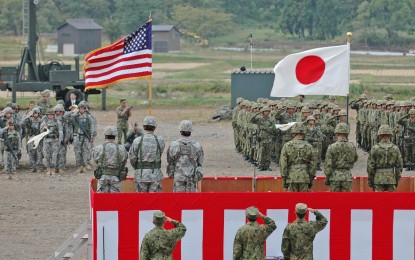(Photo Credit: Japan Daily Press)
(BGF) – On Sunday, May 4, 2014 The Boston Globe picked up a story from the Associated Press discussing the debate in Japan about revising the Japanese constitution. Current Japanese Prime Minister Shinzo Abe has been pushing to revise Japan’s pacifist constitution, which renounces the country’s right to wage war and to maintain an army, navy, and air force. The U.S., which helped to draft Japan’s constitution following the conclusion of World War II, supported Japanese efforts to relax the ban on Japan’s ability to maintain a military during the Cold War as the U.S. sought allies in Asia. The U.S. support for efforts to relax the ban continue today, as the U.S. wants Japan to bear a greater burden of its defense. However, public opinion in Japan is largely mixed on the topic of reinterpreting and revising the Japanese constitution. Click here to read the full article or visit The Boston Globe or Associated Press website.
Japan is divided over making changes to pacifist constitution
By Mari Yamaguchi ASSOCIATED PRESS
TOKYO— Japan marked the 67th anniversary of its postwar constitution Saturday with growing debate over whether to revise the war-renouncing charter in line with Prime Minister Shinzo Abe’s push for an expanded role for the military.
The ruling conservative party has long advocated revision but has been unable to sway public opinion. Now Abe is proposing that the government reinterpret the constitution to give the military more prominence without having to win public approval for revisions.
His push, backed by the United States which wants Japan to bear a greater burden of its own defense, has upset the liberals who see it as undermining the constitution and democratic processes.
Hundreds of people gathered at a Tokyo rally commemorating Constitution Day, a national holiday.
Japan’s pacifist charter is at stake, organizer Ken Takada said: ‘‘We citizens must stand up, take action, and raise our voice to stop Abe, or this country could return to a Japan that wages war with Asia as it has done before.’’
Written under US direction after World War II, the 1947 constitution says the Japanese people ‘‘forever renounce war as a sovereign right of the nation’’ and that ‘‘land, sea, and air forces, as well as other war potential, will never be maintained.’’
That ban has been relaxed over the years, with US encouragement as the Cold War unfolded and America sought allies in Asia, allowing Japan to have a military to defend itself, dubbed a Self-Defense Force.
The ruling Liberal-Democratic Party has long denounced the postwar constitution as one imposed by the United States. Abe’s grandfather and role model Nobusuke Kishi was among vocal opponents of the constitution.
Abe advocates a ‘‘breakaway from the postwar regime’’ as a way to overcome humiliation— symbolically, the constitution— as well as the education system, social values, and historical views set by the US occupation.
A 2012 draft revision proposed by the Liberal Democratic Party promotes a conformist Japan and traditional patriarchal values, placing family units above individuals and elevates the emperor to head of state from the current ‘‘symbol.’’ Civil liberties such as freedom of speech and expression can be restricted if considered harmful to public interest.
Official visits to Yasukuni Shrine, which enshrines war victims including convicted war criminals, would be legalized, and the war-renouncing Article 9 of the constitution reduced to a mere policy, allowing a fullfledged military.
‘‘Our goal is to write a new constitution of our own that envisions a new era and serves a new role,’’ Yasuhiro Nakasone, a 96-year-old former prime minister who heads a group of lawmakers campaigning for a revision, said Thursday at a Tokyo gathering attended by hundreds of lawmakers, their supporters and business lobbies.
With potential military threats coming from China and North Korea, Abe wants to raise Japan’s defense posture further, as well as allow the country to play a greater role in international peacekeeping.
Click here to continue reading.
